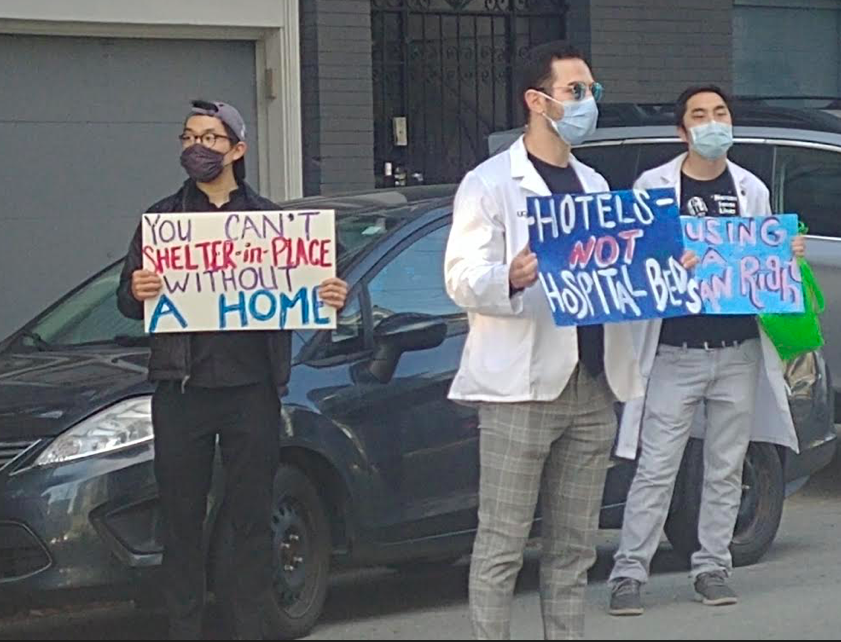The Board of Supes Budget and Finance Committee approved Dec. 9 a measure that would require the city to keep open all of the shelter-in-place hotel rooms, defying a move by Mayor London Breed’s administration to start shutting the program down.

The vote followed a long debate about the purpose and use of the hotel rooms, the availability of other options, and the possible financial burden of keeping homeless people in the hotels and off the streets.
In the end, Sups. Sandra Lee Fewer and Shamann Walton voted in favor of the legislation, and Sup. Rafael Mandelman voted against it.
The measure, by Sup. Matt Haney, is not radical: It’s a 60-day measure, meaning that it would only be in place for two months unless it’s renewed. It simply says that the city should keep open all of the SIP rooms.
The Mayor’s Office wants to start winding down the program, which everyone agrees has been a great success – some 2,300 vulnerable people have been moved off the streets and into safe, secure rooms where they can shelter in place during the pandemic.
The hotels are happy. The residents are happy. There have been very few problems. And the federal government is paying for almost all of the costs.
The issue, homeless director Abigail Stewart-Kahn told the committee, is that at some point the funding from the Federal Emergency Management Agency will end. When that happens, the city will have to either foot the entire bill – upwards of $200 million a year – or evict all of the residents.
The Mayor’s Office wants to start moving people out now, on a schedule, into other forms of housing so that if and when the FEMA funding ends, there won’t be a huge number of people having to leave at once.
The problem, as several supervisors noted, is that the city doesn’t have 2,300 available affordable housing units right now; in fact, Stewart-Kahn said there are only 600 supportive housing units currently vacant. The rest of the people would have to be moved into “safe” shelters, or tent cities, or existing rental housing that they could afford with city subsidies.
All of those options are also expensive – in fact, they cost just as much as the hotel rooms, and the feds aren’t paying for them.
Sup. Hillary Ronen, a co-sponsor of the bill, put it this way: “We don’t’ have any other options. Every other options is just as expensive, less safe, and we don’t get federal reimbursement.”
Haney noted that the federal money will, indeed, run out at some point – but he asked why the city would move people out now, when we are still getting funding for the hotels – and when there are thousands more people on the streets who need safe shelter.
If the Mayor’s Office can find safe, supportive housing for people currently in those hotel rooms, he said, then others who are living on the streets should be allowed to move into the empty rooms.
“The mayor’s shelter plan is grossly inadequate,” he said. “The crisis is that there are so many people unable to shelter in place during that pandemic, it’s not that maybe sometime next year we will have to find them a placement.”
The Mayor’s Office is limiting the hotel rooms to people who fit the FEMA definition of COVID vulnerable – those over 60 or with underlying health conditions – but as Fewer said, “we are all COVID vulnerable.”
Ronen: “If people in the hotels get even another week inside, that’s another week that they stay alive.”
Stewart-Kahn argued that the hotel rooms should be seen as temporary shelter, not as housing. But the city already has state grants to buy two of the hotels and turn them into permanent housing.
It’s not that hard to do – the hotel rooms that are being occupied are at least as habitable, if not more, than some existing SRO units (among other things, they have private baths). And it’s reasonable to assume that under a Biden Administration, more federal money will be available to expand the program allowing cities to buy the hotels.
Mandelman said that the city needs to be preparing now for the fiscal reality that at some point the federal money will end – which would leave the city either evicting the residents are paying the bill with local funds. “That might be the moral and humane thing to do,” he said, “but it’s a $70 million to $100 million project.”
The Haney legislation doesn’t mandate that the city pay that tab, since it would need to be renewed every 60 days, and if the federal money is going to disappear, the city’s going to have some notice of it. (Technically, the FEMA funds renew every 30 days, but it seems highly unlikely that under Biden, the agency will suddenly cut that spending, during the pandemic, without more notice.)
The bottom line – since we are all talking about money here – is that the city has saved lives by allowing homeless people to shelter in hotel rooms (although the Mayor’s Office resisted the idea from the start). Another 5,000 or more people are still living on the streets, and there’s no way the city has any sort of capacity to keep them safe and warm as winter approaches.
The legislation will now move to the full board.





